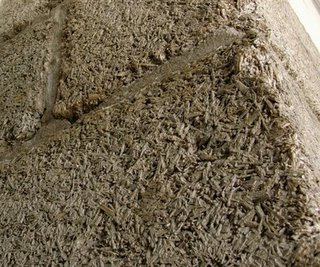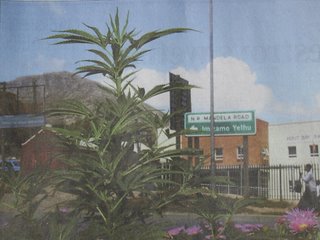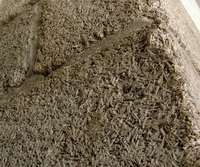A fundamental shift in Swaziland's attitude towards hemp, or dagga, the country's most lucrative cash crop, could be on the horizon.
The government is set to allow small-scale production of hemp to see if it has the potential to become an economically viable crop.
"In hemp we have an alternative to cotton, which has let us down badly over the past few years. It has been because of marijuana that we have found it difficult to talk about hemp, but that is changing, and we are beginning to shape public opinion to its benefits," said Lufto Dlamini, the Swazi Minister for Enterprise and Employment.
"The government is considering a proposal to grow hemp, and a decision will be reached by the end of this month. But I expect it will be given the go-ahead to grow for research purposes, and if that proves successful then we will see," he said.

The government is set to allow small-scale production of hemp to see if it has the potential to become an economically viable crop.
"In hemp we have an alternative to cotton, which has let us down badly over the past few years. It has been because of marijuana that we have found it difficult to talk about hemp, but that is changing, and we are beginning to shape public opinion to its benefits," said Lufto Dlamini, the Swazi Minister for Enterprise and Employment.
"The government is considering a proposal to grow hemp, and a decision will be reached by the end of this month. But I expect it will be given the go-ahead to grow for research purposes, and if that proves successful then we will see," he said.

| 'People are getting the idea that hemp can be used for purposes other than smoking' |
Falling global prices for sugar and cotton, Swaziland's traditional crops, have led to dagga becoming "Swazi Gold" for many of the country's population, most of whom live on less than R7.20 a day.
According to the government's Annual Vulnerability Monitoring Report 2005, cotton prices have fallen steadily over the past few years as a result of international competition and last year's price for cotton was about 33 percent lower than the previous year.
A similar fate has befallen the sugar industry. The European Union plans to slash its price to suppliers in African, Caribbean and Pacific Least Developing Countries by 37 percent from the start of 2007 to bring it in line with the global price, causing the profits of Swazi producers to shrink significantly.
Dr Ben Dlamini, 70, a former education administrator in the Swazi Department of Education, was one of the first people to talk about the potential benefits of hemp production.
"The major emphasis on cannabis in Swaziland has always been on smoking it, but if we were to grow hemp commercially it would solve a lot of problems. It can be used to manufacture fuels, textiles, healthy oils and lotions," he said.
"People are getting the idea that hemp can be used for purposes other than smoking, but the process of understanding this is very slow."
Simon Mavimbela, 21, and Justice Dlamini, 26, have lived all their lives in Hhohho, in the north of the country, the main area for cultivating cannabis, where many people risk growing the illegal plant rather than other cash crops like maize or peanuts.
While both young men insisted that they did not grow cannabis themselves, they admitted that friends and members of their families had grown the plant for generations.
"People here will get around R80 for a 10kg bag of maize when they sell it at the market, but they will get R3 000 for a 10kg bag of cannabis if they can sell it to someone who is going to take it outside of Swaziland," Dlamini explained.
"A person can grow 30 10kg bags in a year up in the hills here, and they use the money to buy cows, furniture, send their children to school.
"We are in a good situation because our fathers grew dagga, so we could afford to go to school, have clothes and other benefits."
According to Dlamini, the only difference between growing cannabis and any other crop is that they have to avoid detection by the police by locating the plantations in inaccessible areas.
"If they are lucky, people from South Africa come and give them the money to start up. They then take the stuff through holes in the boarder fence into South Africa." - Tribune Foreign Correspondent
According to the government's Annual Vulnerability Monitoring Report 2005, cotton prices have fallen steadily over the past few years as a result of international competition and last year's price for cotton was about 33 percent lower than the previous year.
A similar fate has befallen the sugar industry. The European Union plans to slash its price to suppliers in African, Caribbean and Pacific Least Developing Countries by 37 percent from the start of 2007 to bring it in line with the global price, causing the profits of Swazi producers to shrink significantly.
Dr Ben Dlamini, 70, a former education administrator in the Swazi Department of Education, was one of the first people to talk about the potential benefits of hemp production.
"The major emphasis on cannabis in Swaziland has always been on smoking it, but if we were to grow hemp commercially it would solve a lot of problems. It can be used to manufacture fuels, textiles, healthy oils and lotions," he said.
"People are getting the idea that hemp can be used for purposes other than smoking, but the process of understanding this is very slow."
Simon Mavimbela, 21, and Justice Dlamini, 26, have lived all their lives in Hhohho, in the north of the country, the main area for cultivating cannabis, where many people risk growing the illegal plant rather than other cash crops like maize or peanuts.
While both young men insisted that they did not grow cannabis themselves, they admitted that friends and members of their families had grown the plant for generations.
"People here will get around R80 for a 10kg bag of maize when they sell it at the market, but they will get R3 000 for a 10kg bag of cannabis if they can sell it to someone who is going to take it outside of Swaziland," Dlamini explained.
"A person can grow 30 10kg bags in a year up in the hills here, and they use the money to buy cows, furniture, send their children to school.
"We are in a good situation because our fathers grew dagga, so we could afford to go to school, have clothes and other benefits."
According to Dlamini, the only difference between growing cannabis and any other crop is that they have to avoid detection by the police by locating the plantations in inaccessible areas.
"If they are lucky, people from South Africa come and give them the money to start up. They then take the stuff through holes in the boarder fence into South Africa." - Tribune Foreign Correspondent








